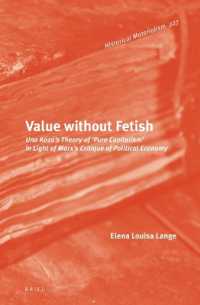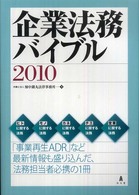- ホーム
- > 洋書
- > 英文書
- > Religion / Ethics
Full Description
Christian Ethics and Commonsense Morality goes against the grain of various postmodern approaches to morality in contemporary religious ethics. In this book, Jung seeks to provide a new framework in which the nature of common Christian moral beliefs and practices can be given a new meaning. He suggests that, once major philosophical assumptions behind postmodern theories of morality are called into question, we may look at Christian morality in quite a different light. On his account, Christian morality is a historical morality insofar as it is rooted in the rich historical traditions of the Christian church. Yet this kind of historical dependence does not entail the evidential dependence of all moral beliefs on historical traditions. It is possible to argue for the epistemic autonomy of moral beliefs, according to which Christian and other moral beliefs can be justified independently of their historical sources. The particularity of Christian morality lies not in its particular historical sources that also function as the grounds of justification, but rather in its explanatory and motivational capacity to further articulate the kind of moral knowledge that is readily available to most human beings and to enable people to act upon their moral knowledge.
Contents
Introduction 1. Varieties of Postmodern Ethics 2. Is Foundationalism Dead? 3. Moral Realism According to Lovibond and Hauerwas 4. How to Defend Moral Realism 5. Morality of Emotion 6. Ethical Naturalism and Theological Ethics 7. Commonsense Tradition and Intuitionism 8. Intuitionism: Philosophical Issues and Replies 9. Commonsense Morality and Christian Morality. Epilogue








